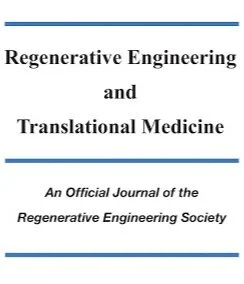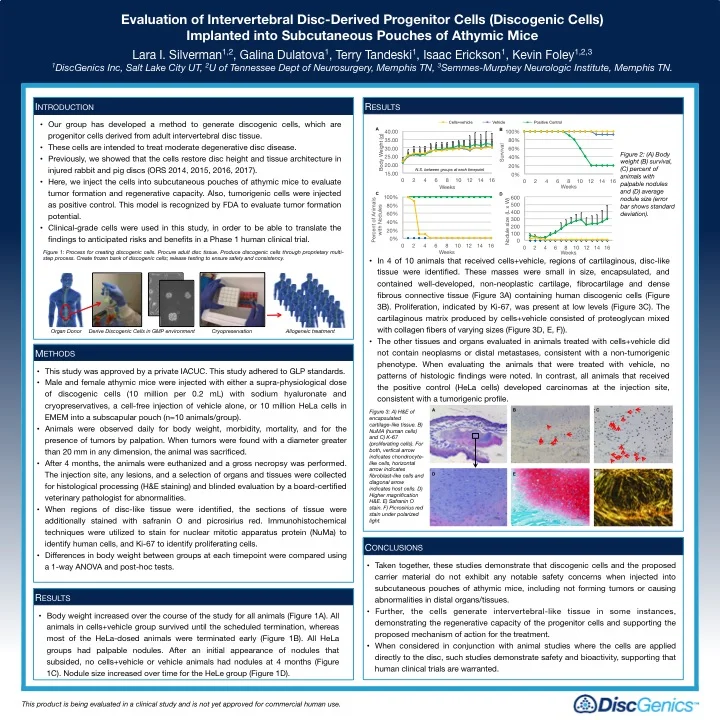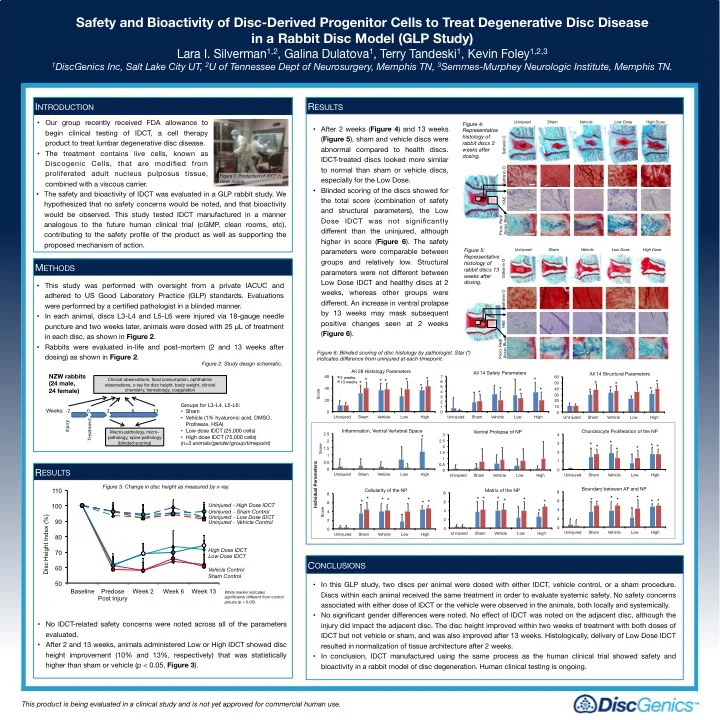Discogenic Cells
dis·co·gen·ic cells [disk-oh-jen-ik selz]
noun.
A manufactured, live progenitor cell population derived from donated adult human intervertebral disc tissue.
Engineering Discogenic Cells
DiscGenics uses its patented allogeneic cell culture manufacturing technology to isolate cells from donated adult human intervertebral disc tissue and induce a progenitor state. These proprietary Discogenic Cells are then expanded for therapeutic application, combined with a delivery vehicle and cryopreserved for off-the-shelf use.
Discogenic Cells are reproducibly manufactured in a cGMP environment and are subjected to extensive testing, including identity, purity, potency and safety evaluations prior to use.
To date, comparability has been demonstrated on over a dozen cell lines, with current production capabilities allowing for the manufacture of thousands of doses from a single donor.
Dual Proposed Modes of Action
Discogenic Cells offer a novel approach to treating diseases of the disc. These specialized cells are hypothesized to not only possess the key regenerative and anti-inflammatory properties found in mesenchymal stem cells (MSCs), but also to produce important molecules that provide support and structure to the disc.
Importantly, prior to the culture process, Discogenic Cells begin as disc cells and already know how to behave in the unique and harsh environment of a degenerated disc. Other approaches that use unspecialized cells from sources like bone marrow or adipose fat tissue must first adapt to the disc environment before even attempting to affect it.
IDCT for Lumbar Disc Degeneration
The first product candidate to utilize the Discogenic Cell platform is IDCT (rebonuputemcel).
IDCT is an allogeneic (donor-derived), non-invasive cell therapy that is being evaluated in two concurrent clinical trials in the U.S. and Japan for the treatment of adult patients with single-level mild to moderate symptomatic lumbar disc degeneration.
During treatment, a single dose of IDCT is injected into the painful disc percutaneously (non-surgically).
Based on preclinical experience with IDCT, we hypothesize that the result will be reduced pain and disability.
Disclaimer: IDCT (rebonuputemcel) is an investigational product that is under development by DiscGenics and has not been approved by the FDA or any other regulatory agency for human use.
Preclinical Studies
Animal studies across various species have consistently demonstrated that IDCT (rebonuputemcel) is safe, shown to be bioactive upon injection, and is well retained within the treated disc.
No IDCT-related safety concerns reported
Significant improvement of disc height observed
Normalization of disc architecture detected
Product Pipeline
Intellectual Property
DiscGenics’ cell isolation and manufacturing process is protected globally by 30 issued patents and 29 additional patents pending, and is trade secret protected.
Scientific Publications
Transition from Static Culture to Stirred Tank Bioreactor for the Allogeneic Production of Therapeutic Discogenic Cell Spheres
August 2021
Design of Experiment (DOE) Applied to Artificial Neural Network Architecture Enables Rapid Bioprocess Improvement
February 2021
Perspectives on the Treatment of Lumbar Disc Degeneration: The Value Proposition for a Cell-Based Therapy, Immunomodulatory Properties of Discogenic Cells and the Associated Clinical Evaluation Strategy
December 2020
Improving Cell Therapy Survival and Anabolism in Harsh Musculoskeletal Disease Environments
February 2020
Identifying and Managing Sources of Variability in Cell Therapy Manufacturing and Clinical Trials
September 2019
In Vitro and In Vivo Evaluation of Discogenic Cells, An Investigational Cell Therapy for Disc Degeneration
August 2019
Clinical Study to Evaluate the Safety and Preliminary Efficacy of IDCT, a Cell Therapy to Treat Moderate, Symptomatic Lumbar Degenerative Disc Disease
February 2019
Presented at the Orthopaedic Research Society (ORS) 2019 Annual Meeting.
Advancing Cell Therapies for Intervertebral Disc Regeneration from the Lab to the Clinic: Recommendations of the ORS Spine Section
December 2018
Discogenic Cell Transplantation Directly from a Cryopreserved State in an Induced Intervertebral Disc Degeneration Canine Model
June 2018
Evaluation of Intervertebral Disc-Derived Progenitor Cells (Discogenic Cells) Implanted into Subcutaneous Pouches of Athymic Mice
March 2018
Presented at the Orthopaedic Research Society (ORS) 2018 Annual Meeting.
Safety and Bioactivity of Disc-Derived Progenitor Cells to Treat Degenerative Disc Disease in a Rabbit Disc Model (GLP Study)
March 2018
Presented at the Orthopaedic Research Society (ORS) 2018 Annual Meeting.
Assessment of Activity and Cell Persistence of a Novel Cell Therapy for the Treatment of Degenerative Disc Disease in a Gottingen Minipig Model: Xenogenic versus Allogeneic Considerations
March 2016
Presented at the Orthopaedic Research Society (ORS) 2016 Annual Meeting.
The Impact of Cryopreservation on In Vitro and In Vivo Potency and Safety of a Novel Cell Therapy in a Rabbit Model of Degenerative Disc Disease
March 2016
Presented at the Orthopaedic Research Society (ORS) 2016 Annual Meeting.
Characterization of a Novel Progenitor Cell with Therapeutic Potential Derived from Adult Human Intervertebral Disc Tissue
June 2016
Presented at the International Society for Stem Cell Research (ISSCR) 2016 Annual Meeting.
Comparative Viability, Potency and In vivo Efficacy of a Fresh or Cryopreserved Cell Therapy for the Treatment of Degenerative Disc Disease
May 2015
Presented at the American Society of Gene & Cell Therapy (ASGCT) 2015 Annual Meeting.
The Effect of Dosing and Cryopreservation on Efficacy and Safety of a Novel Cell Therapy for Degenerative Disc Disease Using a Porcine Model: Sub-Acute and Chronic Time points
March 2015
Presented at the Orthopaedic Research Society (ORS) 2015 Annual Meeting.





















